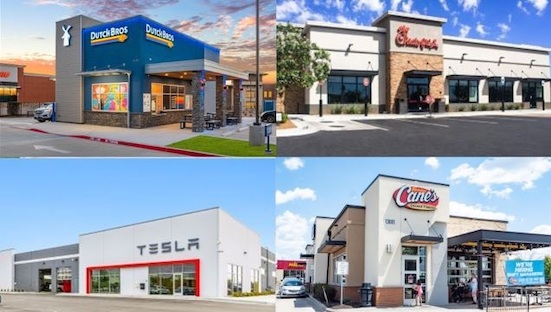Higher interest rates continue to slow the number of investment sales in the net lease sector. And this trend won’t change until the Federal Reserve Board finally begins lowering its benchmark interest rate.
That’s one of the big takeaways from The Boulder Group’s 1st Quarter Net Lease Research Report that the brokerage released in early April.
According to The Boulder Group’s report, cap rates in the single-tenant net lease sector increased for the eighth consecutive quarter within all three major net lease sectors in the first quarter of 2024.
And where do these cap rates stand as of the end of the first quarter? Single-tenant cap rates increased to 6.42%, a jump of seven basis points, for retail; 7.60%, or five basis points, for office; and 7.02%, two basis points, for industrial.
“Cap rates in the first quarter of 2024 represented the highest levels since 2014 for single-tenant retail properties” said Randy Blankstein, president of Wilmette, Illinois-based The Boulder Group. “However, cap rates for single-tenant retail and industrial assets remain lower than their 20-year historical average by approximately 40 basis points.”
Like all commercial brokers, those specializing in net lease brokerage are waiting anxiously for the Federal Reserve Board to lower its benchmark interest rate. This hasn’t happened yet. And until it does? Don’t expect sales activity in the net lease space to rise significantly.
“Elevated interest rates continue to impact transaction volume, which is lower than prior years” said Jimmy Goodman, partner with The Boulder Group. “A lack of 1031 exchange buyer activity is resulting in an increased supply of net lease properties on the market.”
The slowdown in net lease sales has resulted in an increase in available properties. The Boulder Group reported that property supply in the single-tenant sector increased by more than 9% in the first quarter of 2024 when compared to the last quarter of 2023. With limited transactions occurring, properties continue to be added to and remain on the market, according to The Boulder Group’s report.
Despite the headwinds in the market, certain sellers including merchant builders or owners with upcoming loan maturities, look to meet market pricing.
“Net lease retail properties with the largest supply — dollar stores and drug stores –continue to experience the greatest cap rate expansion,” said John Feeney, senior vice president with The Boulder Group. “Both of these sectors experienced double-digit cap-rate expansion in the first quarter of 2024.”
After multiple Federal Reserve meetings without any interest rate relief, investors will be monitoring upcoming rhetoric from the members of the Federal Reserve, the Boulder Group said.
As the company’s report says, any cuts to interest rates would be welcomed by net lease owners looking to refinance or sell properties before the end of the year.
There is hope, too, that sales activity will increase in the next six months. The Boulder Group said that with the stability now in the capital markets, the expectation from market participants is for increased transaction volume in the second half of 2024.
However, an increase in transaction volume without a cut in interest rates? It would be a small increase, not anywhere near a surge, with The Boulder Group predicting that net lease transactions are not expected to end 2024 anywhere near the amount of activity the sector saw in prior peak markets. Including recent ones in 2020 and 2021.




